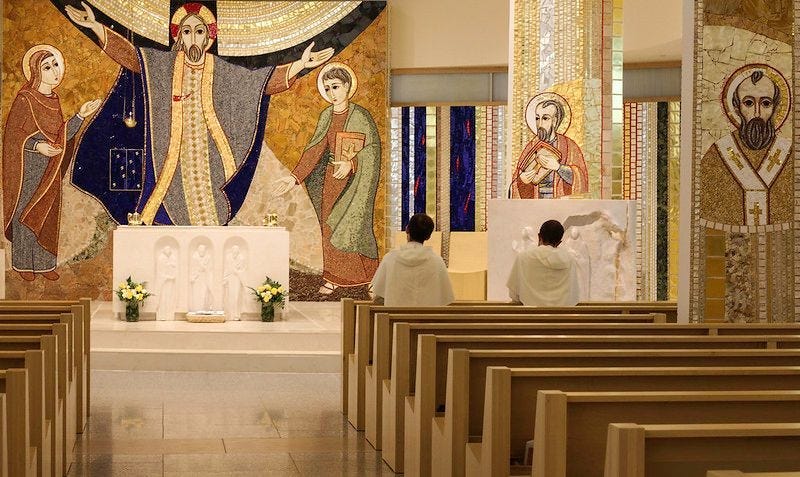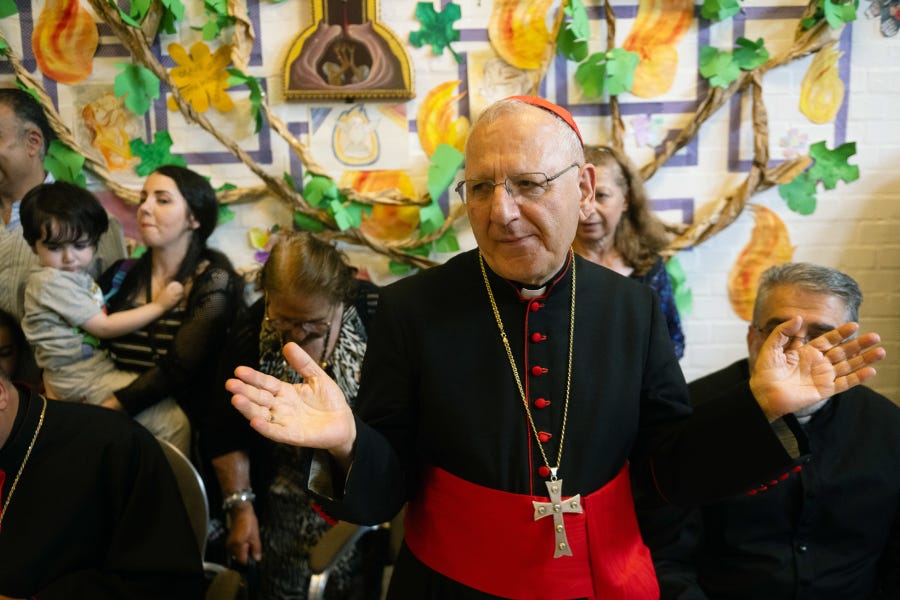Archbishop Carlo Maria Vigano on Monday released a typically prolix dispatch on the Ukrainian crisis, in which he emphatically backed Russian president Vladimir Putin, and appeared to champion the political-religious concept of the Russkiy-mir, or Russian world, which has been used to justify Russia’s invasion of Ukraine.
For some, Vigano’s apparent rationalization of a violent invasion may seem the logical terminus of four years of increasingly unhinged interventions, which have seen him tack to the far fringes of ecclesiastical and political affairs.
But his most recent “declaration” could come as a final shock to his supporters, especially in the United States, who took their cues from the former nuncio during the last election cycle.
In signing himself up to the Russian state and Church’s self-conception as a unified defender of Christian civilization, Vigano has also presented a problem for the nascent integralist movement among some US Catholics.
Those promoting visions of a kind of robust Christian confessional state now face the choice of explicitly rejecting both Vigano and the Russian example, or appearing to vindicate Putin’s war — and with it critics of their own theories, who have long warned that instead of moderating the integralist state, Church authority near-inevitably ends up excusing authoritarianism.
In his March 6 letter, Vigano pointedly referred to Moscow as the “Third Rome,” and appeared to sign himself up to the Russkiy-mir vision of Russia as the legitimate political and religious heir to Rome and Constantinople, cities which the archbishop described as “deserted and silent,” and “hostage to apostates.”
Moscow-as-Rome is a self-conception often articulated by the Russian Orthodox Church’s Patriarch Kirill, but obviously not accepted by the Bishop of actual Rome or the Patriarch of Constantinople, to say nothing of the bishops of Ukraine.
Noting “the common religious and cultural heritage of having once been part of Great Russia” Vigano urged a unified Russia and Ukraine to play “an epochal role in the restoration of Christian Civilization, contributing to bringing the world a period of peace from which the Church too will rise again purified and renewed in her Ministers.”
It is a bold position for Vigano to stake out, given the universal opprobrium heaped upon the Russian invasion and the mounting civilian casualties. It also puts him squarely at odds, not just with his brother Catholic bishops in Ukraine, but with an increasing number of Orthodox bishops, even those under the authority of Patriarch Kirill.
Championing a revanchist Russia to lead “the reconstruction of a Christian Civilization, which alone can save the world from the globalist techno-health transhuman monster,” may also leave some of Vigano’s more politically-minded followers rethinking their positions.
Since his first public “declaration” in 2018, after the McCarrick scandal, the erstwhile apostolic nuncio to the United States has developed something of a cult following among a swath of American Catholics.
During the 2020 presidential election, Vigano repeatedly weighed in in support of President Donald Trump, whom he promoted as a chosen Christian leader prepared to roll back the evils of the “deep state” and “New World Order.”
In the weeks after the election, Vigano appeared more than once, albeit via video link, alongside Catholic YouTube polemicists and other political agitators at rallies aimed at “stopping the steal,” and he lent his voice to claims that the election had been rigged via “the most colossal electoral fraud in history.”
When that movement led to violence on Capitol Hill on Jan. 6, 2021, many Catholic supporters of Vigano and the pro-Trump “stop the steal” movement distanced themselves from the day’s events, and some scrubbed old social media posts which could be interpreted as condoning political violence.
Throughout that period, Putin’s Russia was more than occasionally cited by the same stripe of Catholics, as well as political candidates, commentators, and quasi-intellectuals, as a kind of praiseworthy experiment in integralism; a country where the state’s authority was bolstered and underpinned by its supposedly explicit “Christian values.”
Those assessments tended to make much of the privileged position afforded to the Russian Orthodox Church in public life, and the government’s opposition to the LGBT movement — often framed as a sign of “manliness”, in opposition to an “effeminate” liberal West. But they did not address Russia’s catastrophic abortion rate or Putin’s record of religious and political repression against his own population.
In the wake of Russia’s invasion of Ukraine, which has included the shelling of urban centers and civilian populations, many of those same commentators have adopted a more critical stance on Russia, albeit one which equivocates on Putin’s claims to have been justifiably provoked into invading Ukraine by Western political advances into Eastern Europe.
Vigano’s full-throated defense of Russia on Sunday seems likely now to prove a kind of intellectual line in the sand for some of his American Catholic fellow-travelers.
While the archbishop continues to make much of his ecclesiastical rank, and couched his most recent “declaration” as a kind of Lenten exhortation, he appears increasingly isolated from the communion of the world’s bishops, Catholic and Orthodox — with the notable exception of the Patriarch of Moscow.
He has also now taken a stance resolutely in support of the Putin regime, and lined up behind its program of repression and violence, at home and in Ukraine, as the best hope for rebuilding a “Christian civilization.” This may prove a Rubicon few of Vigano’s remaining fans prove willing to follow him across.
While the Catholic integralist project will likely continue, at least as an intellectual exercise, the specter of political violence now haunts two of the political movements most often associated with it. Grappling with that reality could prove a challenge, as the realities of authoritarianism play out across, of all places, TikTok and Instagram.
Proponents of a strong Christian authoritarian state may increasingly find themselves having to plead that “real integralism has never been tried.”




